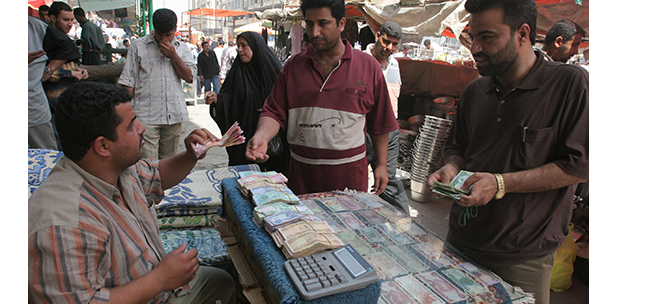
IMF BUYS IRAQ

IMF - The Executive Board of the International Monetary Fund (IMF) today completed the second review of Iraq's three-year Stand-By Arrangement (SBA), which is designed to support Iraq's economic reform program and restore fiscal balance over the medium term. The completion of the second review allows the authorities to draw the equivalent of SDR 584.2 million (about US$ 824.8 million), bringing total disbursements to SDR 1494.2 million about US$ 2109.7 million. The SDR 3.831 billion arrangement (about US$5.34 billion at the time of approval of the arrangement) was approved in July, 2016 and the first review was completed on December 5, 2016.
As part of the completion of the second review, the Board also approved Iraq's request for waivers of non-observance and applicability of performance criteria, and modification of performance criteria. Further fiscal consolidation was achieved in 2016, but at a slower pace than programmed because of weak control of investment expenditure and humanitarian needs. To move the program forward, the authorities are implementing strong corrective measures as prior actions and are committed to further fiscal measures in 2018 to ensure external and debt sustainability.
The Executive Board today also concluded the 2017 Article IV Consultation with Iraq. A respective press release will be issued separately.
Following the Executive Board's decision, Mr David Lipton, First Deputy Managing Director, issued the following statement:
The economic policies implemented by the Iraqi authorities to deal with the shocks facing Iraq—the armed conflict with ISIS and the ensuing humanitarian crisis and the collapse in oil prices—are appropriate. In the fiscal area, the authorities are implementing a sizable fiscal adjustment, mostly through retrenchment of inefficient capital expenditure while protecting social spending. The authorities are appropriately maintaining the peg of the Iraqi dinar to the U.S. dollar, which provides a key anchor to the economy. Performance under the Stand-By Arrangement has been weak in some key areas, but understandings have been reached on sufficient corrective actions to keep the program on track. Resolute implementation of the authorities' program, together with strong international financial support, will be key.
Further fiscal consolidation measures are needed in 2017-18 to keep the program on track. The composition of the fiscal adjustment should be improved over time by increasing non-oil revenue and reducing current expenditure. In addition, reforming the electricity sector and state-owned enterprises will make room for larger and more effective investment expenditure that supports growth and job creation.
Significantly improving public financial management will be important. Arrears need to be assessed and paid following verification, and expenditure commitment and cash management should be strengthened to prevent the accumulation of new arrears.
Measures to bolster financial sector stability include strengthening the legal framework of the Central Bank of Iraq, restructuring state-owned banks, and eliminating an exchange restriction and a multi-currency practice. Measures to prevent money-laundering, counter the financing of terrorism, and strengthen the anti-corruption legislation also need to be implemented.
Implementation of the budget-sharing agreement with the Kurdistan Regional Government would put both the federal government and the Kurdistan Regional Government in a better position to address the shocks to the Iraqi economy.
-----
Earlier:
IMF WANT EUROPE IMF WANT EUROPE The European Union could do more to convince countries to put EU reform recommendations into practice. For example, targeted support from the EU budget could be provided to incentivize reforms. The EU should also conti ...
| 2017-07-26 | Read more » |
| 2017-07-17 | Read more » |
| 2017-07-17 | Read more » |
| 2017-07-17 | Read more » |
| 2017-07-17 | Read more » |
| 2017-07-10 | Read more » |
| 2017-06-28 |





